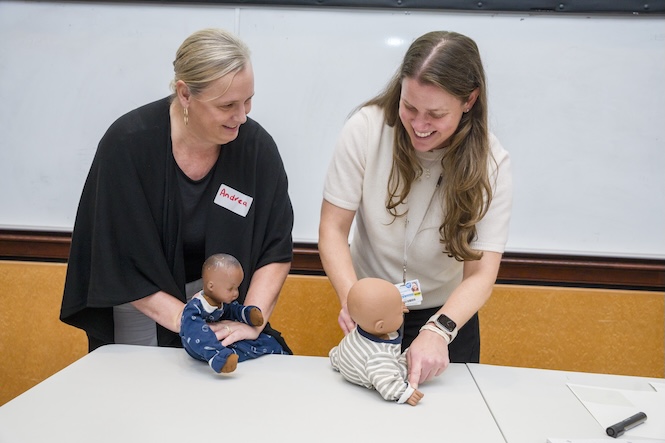
Andrea Clelland leans forward, intently watching a baby move in a video clip. Subtle shifts in posture, reflexes, and facial expressions tell a story she’s trained to interpret. As a pediatric physiotherapist, Andrea is deeply committed to helping infants and families thrive through the early identification of infants with a high probability of cerebral palsy.
The moment was captured during a recent training session for the Hammersmith Infant Neurological Examination held by Sunnybrook’s Neonatal Follow-Up Clinic team, who are on the frontline of training teams to detect cerebral palsy and initiate interventions.
Cerebral palsy refers to a group of conditions affecting movement, coordination and posture due to a non-progressive impact on the developing brain. While it primarily affects motor abilities, it may also involve challenges with sensation, communication, perception and cognition. Early identification and intervention play a critical role in helping children build on their strengths and achieve their full potential.
Sunnybrook’s team works closely with a multidisciplinary group of experts in cerebral palsy and neonatal neurodevelopmental outcomes, including members from Holland Bloorview, McMaster Children’s Hospital and Boston Children’s Hospital, to train clinicians to use the Hammersmith Infant Neurological Examination.
Aligned with international guidelines emphasizing early identification, the approach involves advocating for timely discussions and interventions, avoiding delays associated with waiting until 12 to 24 months. Prioritizing parental voices, one of the primary goals is to offer guidance on communicating high cerebral palsy probability, emphasizing empathetic and transparent communication to support families.
“Early interventions are transformative for children, especially those who have spent time in neonatal intensive care units,” says Dr. Rudaina Banihani, Director of Sunnybrook’s Neonatal Follow-Up Clinic. “At Sunnybrook, we use the examination in tandem with neuroimaging and other tools like the General Movements Assessment to identify children very early at a high probability of developing cerebral palsy. This enables us to truly support children, ensuring the best motor and cognitive outcomes.”
Dr. Banihani explains that the Hammersmith Infant Neurological Examination evaluates cranial nerve function, posture, movement, muscle tone, and reflexes, with each category scored and results tracked over time to monitor progress.
The impact is evident with Kayleigh, a ‘micro-preemie’ born at 23 weeks and six days, who was identified as being at high probability of cerebral palsy by three months corrected age. Corrected age refers to a baby’s actual age in weeks (number of weeks since the date of birth), with the number of weeks the baby was born preterm subtracted. Her care team at Sunnybrook connected her family with local therapy services, and she now sees a physiotherapist and occupational therapist.
Kayleigh’s mother, Kirstin Anderson, says she’s grateful for the early identification and intervention.
“Having a preemie is overwhelming – you’re absorbing so much complex information,” she says. “Kayleigh is an amazing kid who loves finger painting and attending daycare. We’re letting her guide her own way in life with the right supports in place.”
The Hammersmith Infant Neurological Examination is now being implemented across Canada in many Neonatal Follow-Up Clinics and care centres. Over 900 healthcare professionals have been trained, demonstrating strong engagement and a commitment to broadening awareness.
“The exam is straightforward and quick to administer,” explains Andrea, who works at the Neonatal Follow-Up Clinic at Royal Victoria Regional Health Centre in Barrie, Ontario. “It’s incredible how much it empowers families to know early on about the high probability of cerebral palsy and to have the opportunity to begin interventions that make a real difference.”
Sunnybrook’s Neonatal Follow-Up Clinic has established partnerships with Royal Victoria Hospital and other follow-up clinics across the province, improving accessibility for families within their own communities.
“This approach is accessible, efficient, and highly sensitive for identifying infants at high probability of cerebral palsy,” says Dr. Banihani. “The impact is profound: empowered families, timely interventions, and a focus on strengths and resilience. Tracking scores over time helps therapists assess the effectiveness of their interventions and adjust care plans to meet children’s evolving needs.”
A unique feature is Sunnybrook’s ongoing collaboration between Level III Neonatal Follow-Up Clinics and Level II clinics, fostering the development of expertise across care settings and strengthening shared care models.
To learn more about the training sessions, please contact Sunnybrook’s Neonatal Follow-Up Clinic.

